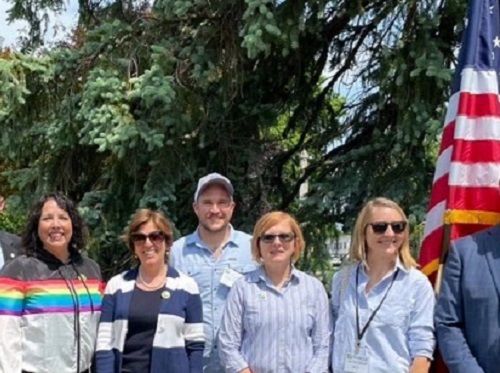The Massachusetts Department of Transportation recently helped provide some $11.6 million in funding through the MassTrails Grant Program to support 68 trail improvement projects statewide.
[Above photo via MassDOT]
Those projects seek to expand and connect the state’s network of off-road, shared-use pathways and trails to use for recreation, exercise, and environmentally friendly commuting.
The MassTrails Grant Program provides matching grants, technical assistance, and resources to individuals, municipalities, non-profits, and other public entities. Funding for those grants come from two sources: The Massachusetts Department of Conservation & Recreation capital budget and Federal Highway Administration Recreational Trails Program grants, managed at the state level by MassDOT.
Program funds go toward the design, construction, and maintenance of diverse, high-quality trails, including hiking trails, bikeways, and shared-use paths, noted MassDOT.
“Outdoor recreation is directly tied to the economic prosperity of our state,” said Governor Maura Healey (D) in a statement.
“By investing in our trails system, we can give our residents opportunities to get outside, commute for free, and showcase all the natural assets Massachusetts has to offer,” she added. “This is how we grow our economy, cut emissions, and improve health outcomes all at the same time.”
“Bicycle and pedestrian paths are a key part of … providing safe and equitable transportation networks which support the state’s transit, economic, climate and public health goals,” said MassDOT Secretary and CEO Gina Fiandaca.
“This grant money for 68 projects will help cities and towns build out the framework for creating a state-wide trails network and we look forward to seeing the positive impacts new trail construction will have for all those who live in, come to visit, or traverse through our state for work or pleasure,” she added.
Additionally, MassDOT recently announced the new, interactive Priority Trails Network Vision Map for statewide shared-use paths.
That map provides a centralized inventory of key rail trail projects that will help support an envisioned comprehensive statewide transportation trail network.
It specifically identifies approximately 320 miles of trails that have been constructed and are in use, another 24 trails that are currently under construction, plus an additional 60 miles of proposed paths that have been funded but not yet constructed.
The map also lists priority shared-use path project locations that either have been proposed for consideration or will be pursued for funding and development to help address key gaps in the network.


